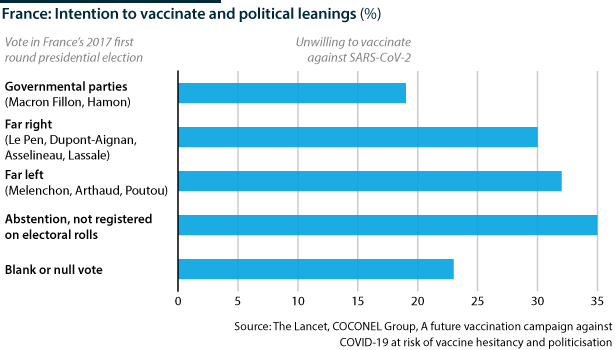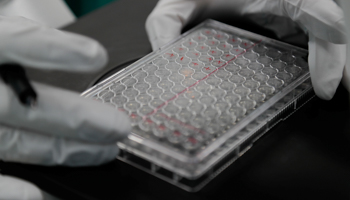Vaccine hesitancy could derail COVID-19 control
Anti-vaccination sentiment is gathering pace and could be a significant barrier to future COVID-19 vaccination efforts
In 2019, the World Health Organization (WHO) cited “vaccine hesitancy” as one of the top ten threats to global health. Amid the COVID-19 pandemic, great hope has been placed on developing a vaccine to help countries return to normalcy. However, for a vaccine successfully to achieve the goal of population immunity, large-scale uptake is crucial. The growing anti-vaccination (‘anti-vax’) movement, which has strong pre-COVID-19 foundations, threatens to derail future vaccination campaigns.
What next
The success of vaccines has erased memories of the devastation caused by the diseases they protect against, leading to complacency. In contrast, the impact of COVID-19 is being felt acutely by all sections of society, and this provides an opportunity to renew confidence in the role of vaccines. Knowledge of why and how vaccine hesitancy arises will better equip groups to combat it. However, if vaccines become subject to political polarisation -- likely to grow once the immediate threat is over -- there is a danger that this will undermine medical responses to the pandemic.
Subsidiary Impacts
- Stakeholders in public health will have to divert increasing amounts of resources to counter anti-vax content.
- Social media companies will come under increasing pressure to ensure they do not give a platform to misinformation relating to vaccinations.
- The full impact of the anti-vax movement will only be revealed when a vaccination campaign commences.
Analysis
The WHO estimates that vaccinations currently prevent between 2 and 3 million deaths annually, and that this could be expanded by 1.5 million by improving coverage.
Vaccines work both by protecting the individual from a disease caused by a specific pathogen and by offering protection at mass level by creating immunity among a critical level of the population so as to halt transmission -- 'herd immunity'. This is the principle that vaccinated individuals break transmission chains, causing infection levels to drop. Consequently, people are still protected even when they cannot access a vaccine or have reasons why they cannot receive it.
The percentage of the population that must be vaccinated to achieve the herd immunity threshold is related to the reproduction number of the pathogen -- its ability to spread. The more transmissible a disease, the higher the number of people who need to be immune to stop its progress through the community.
For example, measles is highly contagious -- each infected person can transmit the disease to 12 to 18 other people. By contrast, the reproduction number for SARS-CoV-2, the virus that causes COVID-19, is estimated to be between 2 and 3. Because of this, measles needs a herd immunity threshold of 92-95%, which explains why even a small drop in measles vaccination rates can have tragic consequences. In 2019, the WHO announced that four European nations had lost their 'measles free' status because of vaccine hesitancy (see INTERNATIONAL: Conspiracy theories cost societies dear - December 19, 2019).
Failure to achieve herd immunity would leave open the possibility of further waves of infection
Researchers at Johns Hopkins University estimate that the required threshold for COVID-19 may be up to 70%. Failure to reach this threshold will leave sections of the population at risk and the possibility of further waves of infection will remain.
Growth of the anti-vax movement
Anti-vaccination sentiment is not new, and certain events have allowed anti-vax ideas to gain traction in society. Arguably the most famous example is the now discredited and retracted article by Andrew Wakefield in 1998 which inaccurately suggested a link between the measles, mumps, rubella (MMR) vaccine and autism. Wakefield's licence to practice was removed as a result. The MMR-autism story lives on as a conspiracy theory that still causes some uncertainty even outside the core of anti-vax believers.
The increase in access to medical information online and exponential growth in social media use has allowed the movement to mushroom. The arguments against vaccinations have been cleverly positioned to broaden their reach and appeal to the public, including framing the movement as 'pro-choice'.
Anti-vax campaigns also continue to exploit a growing global anti-establishment sentiment that was captured by UK politician Michael Gove's assertion that the public had "had enough of experts". Broader criticisms of the profiteering nature of 'Big Pharma' have also helped to stoke the anti-vax narrative.
Endorsement from key public figures has given a false validity to anti-vax arguments. This has been especially noticeable in the United States, where there have been several attempts to tighten vaccine laws in recent years.
A leading figure is Robert F Kennedy Jr, the chairman of Children's Health Defense -- an organisation known for its anti-vaccine activism. Comments by public figures, including celebrities such as tennis champion Novak Djokovic, that have been interpreted as anti-vax have inflamed the situation further.
Research has shown that previous anti-vax tweets from President Donald Trump led to an increase in vaccine concern amongst his supporters. However, he has subsequently received praise for an apparent reversal of this stance during a measles outbreak in the United States, and he has also been positive about the prospective role of a vaccine in the response to COVID-19.
Anti-vaccination sentiment is a global problem, and can be even more challenging and devastating in low-resource environments where relatively poor literacy and digital literacy rates, often in combination with the presence of traditional medicine and healers, make certain communities extremely vulnerable to vaccine misinformation and its consequences (see TANZANIA: COVID-19 may destroy president’s credibility - May 19, 2020).
COVID-19 setting
The fact that COVID-19 has only been around for a few months means that science is still trying to understand its basic parameters. This uncertainty has also provided a unique opportunity for anti-vax groups to build on their momentum, since much of the public is unsure of what to do or believe (see INTERNATIONAL: Falsehoods undercut COVID-19 responses - March 2, 2020).
The novelty of COVID-19 has left the public uncertain what to believe
Anti-vaxxers have strategically aligned themselves with a wide range of COVID-19 narratives to gain broader support for their cause, including general conspiracy theories and the belief that lockdowns are unnecessary and constitute a violation of rights -- anti-vax slogans have been seen at numerous demonstrations.
The extraordinary pace of COVID-19 vaccine development also gives ammunition to the anti-vax community, facilitating accusations of corner-cutting and sacrificing safety (see INTERNATIONAL: Early vaccine may keep some distancing - May 12, 2020). Production and distribution efforts will likely require the assistance of organisations such as the WHO and the Bill and Melinda Gates Foundation, already major targets for the anti-vaxxers.
In a Yahoo News/YouGov poll in early May in the United States, only 55% of respondents said they would get vaccinated for COVID-19, with the remainder split between saying they would not, or were unsure. Another poll, from Morning Consult, found similar overall figures but showed that compared to Democrats, independents were twice as likely, and Republicans three times as likely, to refuse a COVID-19 vaccination.
A poll in France conducted ten days after lockdown was introduced on March 27-29 showed that even in the midst of movement restrictions, 26% of respondents said they would not get vaccinated against SARS-CoV-2 if a vaccine became available. Those who voted for far-right and far-left parties and those who abstained were more likely to refuse vaccination.
This suggests that views on the issue are shaped by political beliefs, not just the science.
Outlook
Anti-vax groups will continue to gain momentum, especially on social media platforms where the current 'infodemic' and general uncertainty provides fertile ground for growth of the movement's supporter base. For any potential vaccine, the possibility of herd immunity depends on the measures taken to counter this content.

